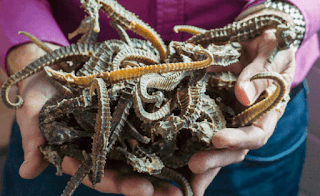 The Dutch government has seized 14,000 dead seahorses as part of a major crackdown on the illegal wildlife trade. Over the last two months, they have also confiscated a polar bear skin, 120 arapai fish, a green sea turtle shell, and 10 shipments of live coral. The seahorse smuggler was sentenced to just six months in prison, three of which were suspended.
The Dutch government has seized 14,000 dead seahorses as part of a major crackdown on the illegal wildlife trade. Over the last two months, they have also confiscated a polar bear skin, 120 arapai fish, a green sea turtle shell, and 10 shipments of live coral. The seahorse smuggler was sentenced to just six months in prison, three of which were suspended.
2. Mexico Designates Largest Marine Reserve in North America
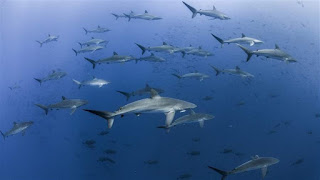 The Revillagigedo Archipelago National Park, comprising 58,000 square miles of pristine ocean waters, has been designated a marine reserve. It consists of four volcanic islands: Claríon, Roca Partida, Socorro, and San Benedicto. The new protected area, about 240 miles southwest of the tip of Baja California, is home to “four species of sea turtles, more than 37 species of sharks and rays, and at least 366 species of fish, dozens of which are found nowhere else on Earth.”
The Revillagigedo Archipelago National Park, comprising 58,000 square miles of pristine ocean waters, has been designated a marine reserve. It consists of four volcanic islands: Claríon, Roca Partida, Socorro, and San Benedicto. The new protected area, about 240 miles southwest of the tip of Baja California, is home to “four species of sea turtles, more than 37 species of sharks and rays, and at least 366 species of fish, dozens of which are found nowhere else on Earth.”
———————————————–
3. “Hidden” 99% of Microplastic Now Identifiable with Fluorescent Dye
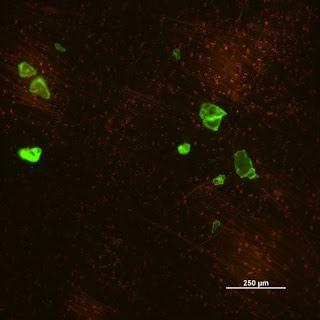 Microplastics are a major problem in our oceans, and scientists have come up with a way to identify the “lost 99%” of them. Researchers at the University of Warwick found that microplastic floating in seawater can be dyed fluorescent green to help identify it. They found more microplastics than they could see using traditional methods. The scientists are working on a 3D distribution map of plastic circulating in the oceans.
Microplastics are a major problem in our oceans, and scientists have come up with a way to identify the “lost 99%” of them. Researchers at the University of Warwick found that microplastic floating in seawater can be dyed fluorescent green to help identify it. They found more microplastics than they could see using traditional methods. The scientists are working on a 3D distribution map of plastic circulating in the oceans.
———————————————–
4. Rare Outbreak of Bipartisanship on Fighting Ocean Pollution
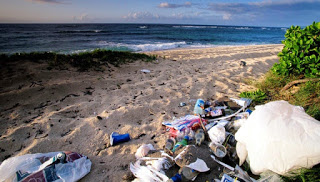 The U.S. Senate unanimously passed the Save Our Seas Act of 2017, which reauthorizes a NOAA-led marine debris program for five years. It also encourages working with other nations to combat ocean pollution. The House will hopefully pass the legislation in 2018. “The Save Our Seas Act recognizes the interconnectedness of the world’s waterways and coastlines, and the need to address the issue of marine debris not only in the ocean but where it starts: in human hands.”
The U.S. Senate unanimously passed the Save Our Seas Act of 2017, which reauthorizes a NOAA-led marine debris program for five years. It also encourages working with other nations to combat ocean pollution. The House will hopefully pass the legislation in 2018. “The Save Our Seas Act recognizes the interconnectedness of the world’s waterways and coastlines, and the need to address the issue of marine debris not only in the ocean but where it starts: in human hands.”———————————————–
5. Australia’s Great Barrier Reef Receives Successful Fertility Treatment
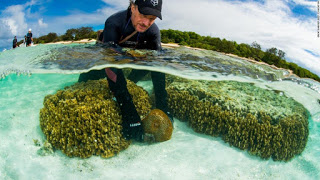 Last November scientists at Heron Island Research Station collected coral sperm and eggs during the annual reef spawning event. The scientists put them in tanks for fertilization and transplanted the coral back to the Great Barrier Reef. A year later, the juvenile coral had established themselves on the reef. The experiment was re-created this November, and new coral larvae have successfully settled.
Last November scientists at Heron Island Research Station collected coral sperm and eggs during the annual reef spawning event. The scientists put them in tanks for fertilization and transplanted the coral back to the Great Barrier Reef. A year later, the juvenile coral had established themselves on the reef. The experiment was re-created this November, and new coral larvae have successfully settled. ———————————————–
6. Ocean Enthusiasts Could Help Gauge Coastal Warming
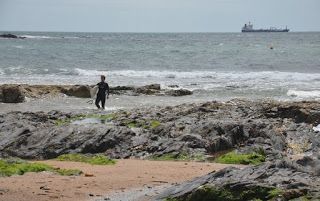 Scientists want to enlist surfers, scuba divers, and anglers to monitor coastal areas vulnerable to climate change. They proposed the idea after scientists using surfboard laboratories recorded temperatures along several coastlines that were 1 degree Celsius warmer than those measured by satellite. Scuba divers could use their dive computers to measure temperatures and upload the data, and coastal anglers could use temperature-sensing wading boots.
Scientists want to enlist surfers, scuba divers, and anglers to monitor coastal areas vulnerable to climate change. They proposed the idea after scientists using surfboard laboratories recorded temperatures along several coastlines that were 1 degree Celsius warmer than those measured by satellite. Scuba divers could use their dive computers to measure temperatures and upload the data, and coastal anglers could use temperature-sensing wading boots.———————————————–
Be sure to “LIKE” http://facebook.com/SeaSave to ensure our “Week in Review” is delivered to your newsfeed every Friday.
Sea Save Foundation is committed to raising awareness of marine conservation. The Week in Review is a team effort produced by the Sea Save staff to provide a weekly summary of the latest in marine research, policy, and news.




